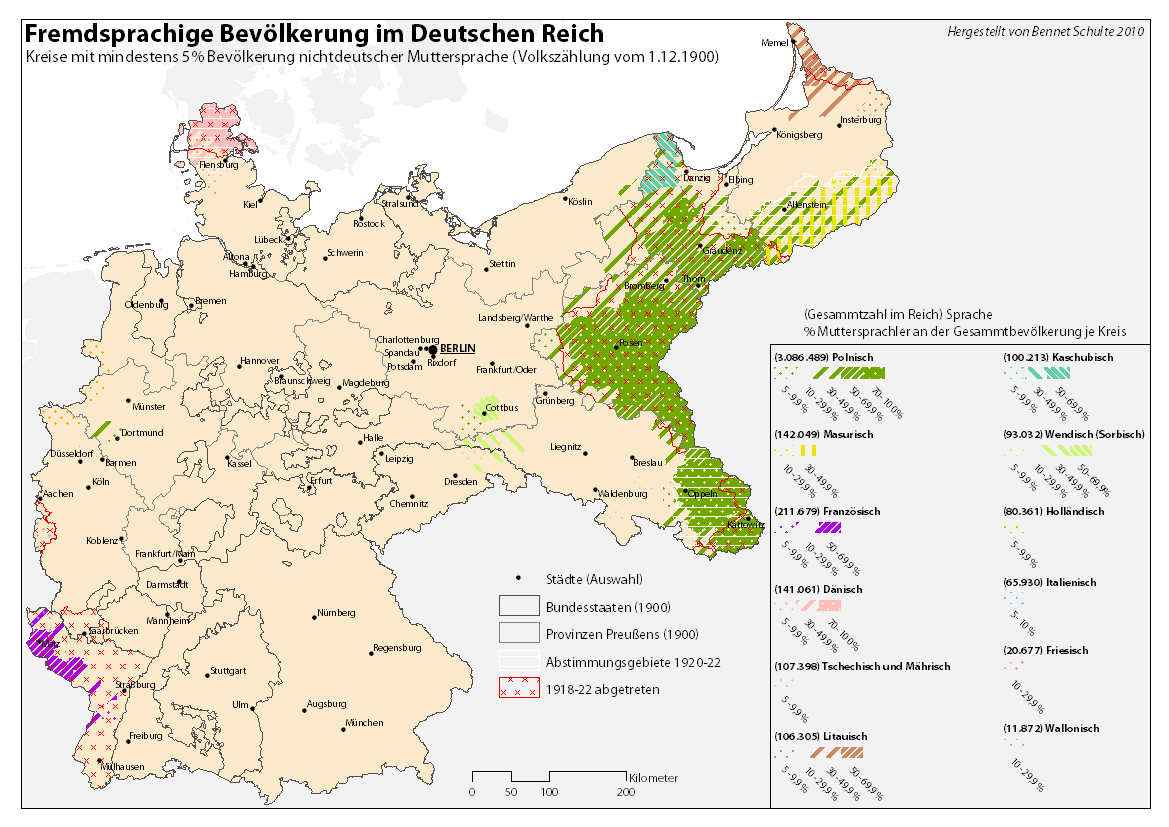Between the 1400s and the 1800s large parts of East Prussia had ethnically Lithuanian and Polish majorities.
1) This area was known as Lithuania Minor (
Kleinlitauen) and had Lutheran Lithuanian-speaking majority:
Counties: Gumbinnen, Insterburg, Niederung, Heydekrug, Tilsit, Ragnit, Darkehmen, Stallupönen, Memel, Labiau and Pillkallen
2) This area had Lutheran Polish-speaking majority and was known as Masuria (Masuren):
Counties: Ortelsburg, Johannisburg, Neidenburg, Lyck, Lötzen, Sensburg, Oletzko, Osterode, Angerburg
In counties Rosenberg, Rastenburg and Mohrungen Polish-speakers were in minority.
The county of Goldap was ethnically mixed Lithuanian-Polish (and later also Germanization occured there).
3) This area had Catholic Polish-speaking majority, Southern Warmia (Ermland):
Counties: Allenstein, Rössel
4) The remaining areas had German-speaking majority already before the 19th century, those were:
a) Catholic Germans:
Northern Warmia (Ermland), counties of Braunsberg and Heilsberg
b) Protestant Germans:
Pr. Holland, Mohrungen, Heiligenbeil, Pr. Eylau, Friedland, Gerdauen, Wehlau, Königsberg, Fischhausen
The Kurische Nehrung (Curonian Spit) was inhabited by Latvian-speaking people (Kuršininkai).
As for the original, Old Prussian population:
Old Prussian language got extinct at the beginning of the 18th century. The last speakers of Old Prussian lived in the Sambia Peninsula (Samland), which is roughly the same region as county Fischhausen, plus northern and eastern parts of county Königsberg.
====================================================
Year - number and percent of Lithuanian-speakers in East Prussia:
late 1810s - 200,000 (18,52% of the population of East Prussia)
1825 - 139,268 (12,13% of the total population of East Prussia)
1837 - 148,301 (11,49%)
1848 - 150,580 (10,26%)
1871 - 139,450 (7,65%)
1878 - 131,415 (6,91%)
1890 - 121,345 (6,19% of the total population of East Prussia)
Figure for the 1810s is an estimate published in year 1825. Other figures are from official German census data.
Year - number and percent of Polish-speakers in East Prussia:
late 1810s - 280,000 (25,93% of the population of East Prussia)
1825 - 252,824 (22,02%)
1837 - 264,559 (20,49% of the total population of East Prussia)
As with Lithuanians, the first figure is an 1825 estimate, other figures are official census data.
It seems that before 1861 in census data bilinguals (Polish-German or Lithuanian-German) were counted as Germans.
I have also numbers for other years, but for each county separately, and I haven't added them together yet.
Data on Polish-speakers in Masuria (but not in Catholic Warmia) can be found here (in German):
http://www.zfo-online.de/index.php/zfo/ ... le/134/134
As for Warmia (Ermland):
According to German author von Haxthausen (who quoted census data), there were 32,311 Polish-speakers in Warmia in 1825. According to "Gazeta Olsztyńska" (published in Allenstein) from 14.05.1886, there were 60,000 Poles in Warmia at that time.
masurian and polish speaking people lived there.
Masurian = Polish. It the same dialect of Polish which is spoken in Mazovia (hence the name Mazovian/Masurian).
The difference was that Poles in Masuria were Lutheran (since the late 16th and 17th centuries), not Catholic.
Prussian Lithuanians in Klein Litauen were also Lutheran. Poles in Warmia, however, have been Catholic.
There are words which carry the presage of defeat. Defence is such a word. What is the result of an even victorious defence? The next attempt of imposing it to that weaker, defender. The attacker, despite temporary setback, feels the master of situation.



